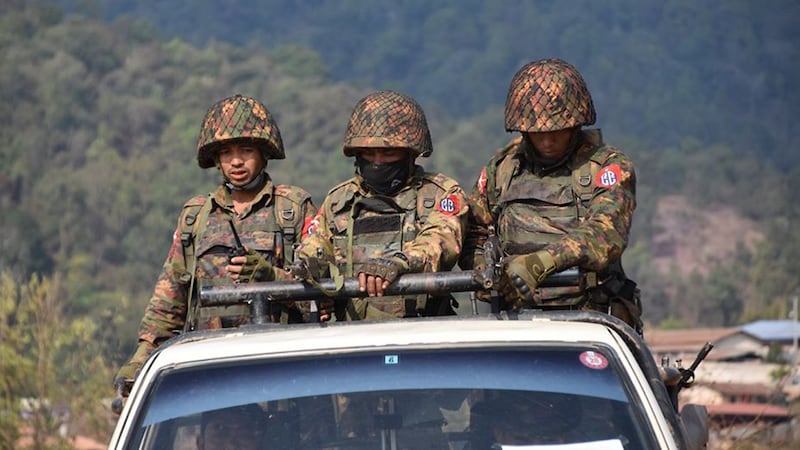More than 50 officers and their family members deserted Myanmar’s military and joined the anti-junta Civil Disobedience Movement in the first two weeks of August, according to an official with the shadow National Unity Government, or NUG.
Among the defectors were two officers holding the rank of major, three captains and 10 servicemen holding various other ranks, said Maung Maung Swe, the spokesman for the NUG’s Ministry of Defense.
“Approximately 14 people tried to connect with us through the People’s Embrace,” he said, referring to a group that works with military deserters. “According to the list we received from all over the country, more than 50 people have joined us in two weeks.”
Several of the deserters came from units based in northwestern Myanmar’s Chin state and Kayah state in the country’s east, Maung Maung Swe said.
“Just yesterday, two junta soldiers involved in attacking Let Khat Taung Hill in Myawaddy joined us and brought their weapons,” he said, referring to a township in Kayin state on the border with Thailand.
Sergeant Zey Ya of the People’s Goal, a group assisting CDM employees, told RFA that while 50 officers and their families switched sides in the past two weeks, “more deserters left junta bases and are hiding on their own” without connecting with the armed resistance.
Zey Ya said that the deserters may have been prompted to leave ahead of a junta plan to upgrade national registration cards to “smart cards” that would make it harder for them to do so because they will be linked to a computer network.
“The junta is planning to upgrade national registration cards to smart cards nationwide so that those who are planning to desert won’t be able to run,” he said. “Those familiar with the junta’s plan knew it would begin with military service members and started fleeing because once these smart cards are in use, they won’t be able to get through the junta’s checkpoints.”
The desertions come amid increased military offensives that include airstrikes and mortars in Myanmar’s Sagaing, Magway and Tanintharyi regions, as well as in Chin, Kachin, Shan, Kayah and Kayin states.
However, reports from armed ethnic groups claim that the junta has lost military camps in Kayah, Kayin and Kachin state, despite the reported spike in offensives. The junta does not typically publish information about the status of its military bases, and RFA was unable to independently verify the claims.
Troops have ‘lost heart’ and confidence
Officers who joined the Civil Disobedience Movement, or CDM, of government employees who have left their jobs in protest of the military’s Feb. 1, 2021, coup d’etat, said that the morale among service members is flagging as soldiers have “lost heart.”

A deserter captain from Chin state who joined the CDM told RFA that junta authorities no longer trust soldiers enough to post them on individual guard duty anymore.
“Despite the shortage of personnel, they post two guards on sentry but allow them only one rifle,” said the deserter, who gave his name as Captain Block, citing security concerns. “This means that if they choose to desert, the military would lose only one rifle.”
Attempts by RFA to contact junta Deputy Information Minister Major Gen. Zaw Min Tun for comment went unanswered Tuesday. RFA was also unable to contact Thant Zin, the junta spokesman for Chin state.
Maung Maung Swe, of the NUG’s Ministry of Defense, said there are two main reasons he sees for the increase in desertions.
“The first one is that service members have come to realize that, as the war escalates, their lives have no guarantee if they continue to stand with the junta,” he said. “The second reason is that they’ve lost trust in their fellow troops.”
He noted an increase in reports from the CDM of dismissals and killings within the military’s own ranks, including one recent incident that led to the dismissal of more than 60 servicemen.
“One officer was promoted to the rank of general one day and disappeared the next day, and similar incidents like that are increasingly happening within the military,” he said. “When the soldiers dismiss and kill each other like that, it shows that the military is disintegrating and its troops no longer have confidence.”
Translated by Myo Min Aung. Edited by Joshua Lipes and Malcolm Foster.

